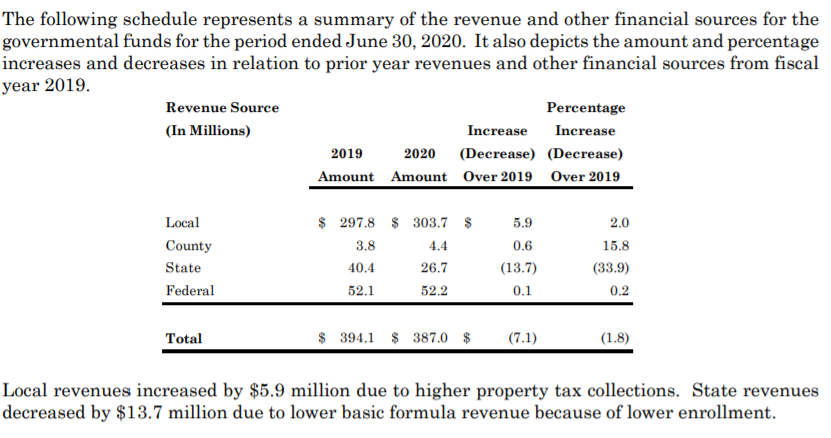For starters, we should clarify that we are focused on our 3 current asks:
1. Support for a new schools moratorium
2. Creation of a citywide comprehensive plan for schools
3. Curbing of tax incentive abuse
This thread will largely be focused on the above. But first!
2/
General Remarks
Funding for local public school districts comes from 3 primary sources: local, state, and federal. According to the 2020
@SLPS_INFO Comprehensive Annual Financial Report (CAFR), 80% of revenue comes from local revenue, 13% from the state, and 7% federally.
3/
Local funding is primarily generated by property taxes, state funding gets dispersed from GR and a few other sources (lottery, etc.) to each district statewide based on the Missouri Foundation Formula, and federal funding comes in for various federal programs.
4/
State lawmakers frequently tout "fully funding" the Foundation Formula, but this is deceptive. The tried-and-true method to get to this is reduce the bar for what it means to "fully fund" the formula.
Some refs:
https://t.co/3K9vhoIQJp &
https://t.co/x6eplASzs4 5/
Fully breaking down the Foundation Formula and how lawmakers play games with it would be a whole other🧵 so we will leave it at that for now. What we want to focus on is what can happen regarding each ask at each level. Let's start with the moratorium.
6/
New School Moratorium
When we talk about a new school moratorium, we are talking about a new *charter* school moratorium.
@SLPS_INFO is not in a position to open new schools.
To understand this, we need to look at how charter schools get opened/closed in the first place.
7/
A charter school gets started by a private group gets together and submits an application to the MO Department of Elementary and Secondary Education (DESE) which includes a sponsor and a contract or "charter" with that sponsor that serves as an operational plan.
8/
The public school district in which the charter will operate has to be one in which charter schools are allowed. This happened to #STL City and Kansas City in the early 2000s due to accreditation issues. This is from the DESE website:
9/
Ultimately if an application is submitted to the State Board of Education that meets the basic requirements, there is basically no functional way for the Board to deny it. This pushes the problem back to state lawmakers to regulate the process.
10/
The state level is the only place where you could impose a blanket charter school moratorium. This is very unlikely to happen given the current make-up of #MOLEG. In fact, it is the Speaker of the House’s priority to push #edreform this session.
https://t.co/1PLpC1KCHM 11/
Stll, there are a lots of ways for local lawmakers could exercise in #STL to make things more difficult for new charter schools to open or expand. For starters, the BOA could pass a non-binding resolution supporting no new schools/charter expansions without a citywide plan.
12/
This won’t change any laws, but it signals important allyship. The BOA has had no problem weighing in on schooling issues in the past, including what to do with old public school buildings and passing a resolution on the recent SLPS closures.
13/
Further, the BOA has tools to significantly hamper a charter school from starting/expanding. They could deny TIF/abatements or said developments. More directly, they could pass that would deny building permits on properties slated for charter schools/expansions.
14/
See BB154:
https://t.co/L8MVw6N2YO There may be some legal questions on the latter, but shows that there may be some creative solutions within Aldermanic purview.
Some charter-related construction is funded by New Markets Tax Credits, which are under the purview of SLDC
15/
The chair of the HUDZ and the chair of Ways & Means committees at the Board of Aldermen both sit on the requisite Board. Further, the mayor makes numerous appointments to SLDC. Combined with the BOA’s actions, charter-related construction could be completely axed.
16/
Finally, individual members of the BOA or the Mayor could refuse campaign contributions from privateers, refuse to support new or expansions of charters in their areas, or use the bully pulpit for the cause. These are less formal fixes, but could serve an important role.
17/
The relationship between the district and the Board of Aldermen is certainly not in the best place, and committing to working collaboratively would be a huge step forward to protecting SLPS. Which brings us to our next point: A comprehensive citywide plan.
18/
Comprehensive Plan
The call for a comprehensive citywide plan on school openings and closures represents a chance for the St. Louis City Board of Education, SLPS Admin, the BOA, the Mayor, the Comptroller, and other City elected officials...
19/
...as well as operators of charter schools, to come together and create something sustainable.
20/
As an anti-privatization group, we’d ultimately want all schools receiving public tax dollars to come under democratic control. But this step allows charter and public school admins to work together for the betterment of all students in #STL schools receiving public $$$.
21/
Working with city officials, they could all agree to something like a moratorium, and with a collective push that might (optimistically) push state lawmakers to take necessary action.
22/
What a comprehensive plan has the potential to do is stop the hemorrhaging of SLPS schools while charter schools proliferate. School choice proponents who do not want to engage in this are showing their cards: the full demise of SLPS. We expect this to ultimately arise.
23/
However, one thing the comprehensive planners could work on is shielding public school tax dollars from tax incentive/abatement programs. Some of this happens at the local level, and some at the state, which gives us a perfect transition for…
24/
Curbing Tax Incentive Abuse
We've run out of room so will need to continue this on a different thread! We will comment on this thread to that thread haha.
25/
Here are some things that can be done to reduce the damage to public school dollars:
Mandate Payment In Lieu Of Taxes (PILOTS) every year of an abatement to SLPS so we are significantly cutting back on lost revenue [Local]
26/
Cap abatement/incentives to protect revenue [Loca]
Severely restrict use of incentives/abatements on luxury developments which do not need the packages, and to developers who could otherwise carry on without them. [Local]
Severely restrict unit reduction abatements [Local]
27/
Severely restrict TIFs/Tax Abatements in Gentrified or Gentrifying Areas. [Local]
Conflict of Interest Provisions for TIFs/Tax Abatements re: campaign contributions from developers [Local primarily; State possible]
Hold SLPS harmless from TIFs and Tax Abatements [State]
28/
Whatever solutions - and we are sure there are many more - that lawmakers could take, they really should be binding. Otherwise, we’re left with a system where folks can squirm out of following ‘the rules’ for whatever purposes they see fit.
29/
We hope that this thread is helpful for folks seeking to understand what’s going on, how certain mechanisms work, and much more. This certainly isn’t comprehensive, & really just touches the tip of the iceberg, centered around our petition asks. Let us know if you have Qs!
30/
You can sign the petition here:
https://t.co/iuQpVFeCrT Shoot us an email at
[email protected] And we hope (!!!) to start getting together a website to make this information even more accessible.
Solidarity!
31/31
Bonus Material:
Saint Louis Public Schools Comprehensive Annual Financial Report - 2020 -
https://t.co/KuJp9fpLFD City of Saint Louis Comprehensive Financial Report - 2020 -
https://t.co/7Vh0FkLAWl
And apologies for any grammatical/spelling errors - let us know if we need to clarify!


